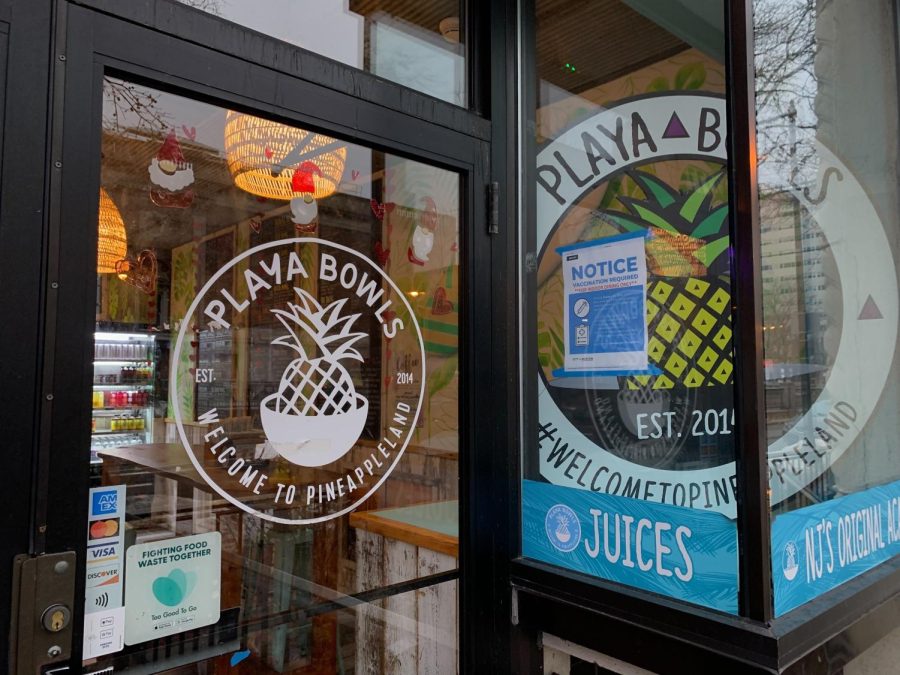Boston restaurants speak out against vaccine mandate
The local restaurants have been hit hard since the start of the pandemic, and even more so now with the Boston vaccine requirements in place. Businesses like Playa Bowls, pictured above, continue to stay open for students and other patrons alike. Photo credit to Harriet Rovniak.
February 9, 2022
When the Omicron variant surged to the forefront of the COVID-19 pandemic in December 2021, Boston Mayor Michelle Wu announced a mandate requiring patrons of many indoor spaces, including restaurants, gyms and concert venues, to show proof of vaccination to enter.
The mandate went into effect Jan. 15 and since then, businesses owners have been reporting major losses in profit. The restaurant industry has been hit especially hard with some businesses losing as much as $15,000 in revenue per week. This has prompted the Massachusetts Restaurant Association, or MRA, to write a letter to Wu in an effort to get the mandate reversed.
“Every restaurant in the city is impacted at one level or another,” said Steve Clark, the chief operating officer of the MRA.
With large events such as trade shows and regional bus tours being rescheduled to locations outside of Boston, the city’s restaurant scene has claimed to see a decrease in patrons, according to the letter the MRA sent to Wu and emailed to The News.
Sharing personal information can be difficult for some people, despite many of them already being vaccinated. Massachusetts’s vaccination rates are higher than those of most other areas of the United States.
“Some people are hesitant to share their medical information,” Clark said.
Larger events are not the only ones affected; smaller restaurants throughout the city are also feeling the impacts of the mandate.
“Our events are pretty much nonexistent,” said Bobbi Louyakis, a manager at Atlantic Fish Company, a seafood restaurant located in Back Bay.
Louyakis reports that what used to be large corporate and family events held in the restaurant’s event space has been whittled down to occasional groups of five to 10 people. This has been even further reduced as permits for temporary patio spaces in Boston ended on Dec. 31, 2021.
The people who choose to still dine out in Boston have given little pushback to the mandate. In fact, they are “almost excited” to show their vaccination cards, as Louyakis described. Many customers are thankful for the mandates, stating that it makes their dining experience safer.
“As a customer, [I feel] a little more comfortable knowing that everyone is vaccinated,” said Boston resident Keith Patrick.
However, this does not speak to the amount of people choosing to stay home or eat elsewhere.
“Though our customers are generally understanding of the vaccine requirement, now that [the] number [of patrons is] declining, we look forward to the mandate coming to an end,” said Philip Frattaroli, a managing partner and CEO at Filmark Hospitality Group, which owns and operates several Boston restaurants, in an email statement to The News.
Some Boston residents who have chosen to remain at home rather than going out to eat have turned to takeout as an alternative. However, takeout can cost restaurants more to prepare, especially with the recent increase in popularity of third party delivery services. These providers implement high fees on the businesses they service, which deducts from the restaurants’ already decreased profits.
“Sales have decreased drastically,” Louyakis said, “[but] our restaurant group is doing better than most.”
This January was one of the slowest Louyakis has ever seen, and while the restaurants were not given warning prior to the announcement of the mandate, it did not come as a shock.
“It was new, but it wasn’t surprising,” Louyakis said.
Once the mandate was announced, restaurants worked quickly to prepare. Businesses promptly shifted their rules to remain in compliance with city standards, getting all staff members vaccinated so as to ensure the safety of visitors. However, the vaccine mandate does not guarantee a lack of transmission.
“The prevalence of the Omicron variant has shown the virus can be transmitted by any person to another person, regardless of vaccination status,” the MRA wrote in their letter to Wu.
With masking and social distancing still widely in place, businesses are working hard to keep customers safe.
“The vax mandate simply changes the dining dynamic, many guests don’t want to deal with it, or maybe one member of their dining party is not vaccinated for one reason another, now they simply choose to dine in another city,” wrote the MRA.
The organization has offered other suggestions to encourage vaccination among Boston residents, such as placing higher costs on health insurance and tests for unvaccinated people, aiming to place the responsibility of vaccination on the individual rather than on the businesses that have already struggled through two years of decreased profit and staffing shortages.
Some of these restaurants received financial support from the federal government in light of pandemic losses, which is especially beneficial with the mandate driving sales down. Recovery for restaurants is a question of “did you get [the Restaurant Revitalization Fund, or RRF,] funding or did you not get RRF funding,” Clark said.
While the restaurant industry can look forward to an upward trend in business as the weather warms, business owners will continue to feel the long term effects of the pandemic.
“Any lost business is not going to come back,” Clark said.







